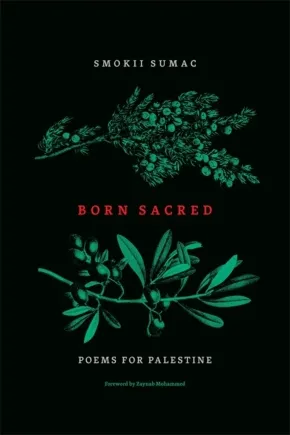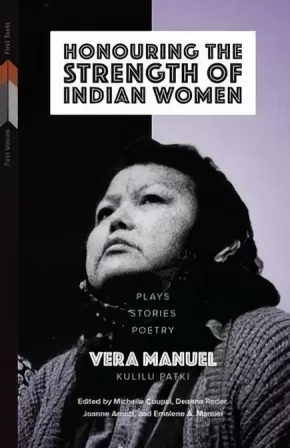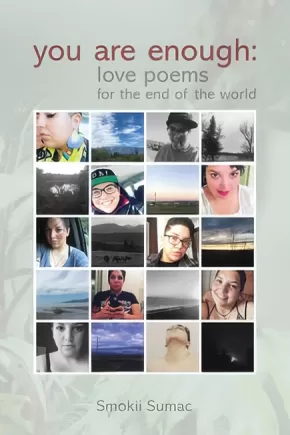Ktunaxa (Kootenay)
Synopsis:
A journalistic poetry collection reflecting on Palestinian and Indigenous solidarities, genocides, life, and liberation.
In October 2023, upon witnessing the escalation of Palestinian genocide, Ktunaxa poet Smokii Sumac began writing poems reflecting on the stories of Palestinians in Gaza who were risking their lives to share news of the genocide of Palestinian culture, literature, and life. These 100 poems offer a witnessing of the escalation of colonial violence, both current and historical, across oceans, lands, cultures, and people, and the reckoning one has in the face of a genocide.
Vulnerable, eloquent, compassionate, and enduring, Born Sacred is an in-time reflection honouring the shared histories of Indigenous Peoples of North America and of the people in Palestine. Sumac offers this collection as a small piece of life dedicated to Palestinians and resounds the collective call for solidarity in our shared liberation.
Reviews
"Born Sacred: Poems for Palestine is a profound work of grace and solidarity, rooted in a hard-earned understanding of colonialism’s insatiable appetite. What Smokii Sumac has done, over the course of 100 searing, open-hearted poems, is give voice to the immeasurable grief of bearing witness to genocide – the overwhelming magnitude of it, colliding with a knowledge that this has happened before, that there is an age-old methodology to the act of endless taking. I am so grateful for this work, for this beautiful, honest reminder that, whatever power empires wield, we have what it can never take. We have one another."— Omar El Akkad, author of What Strange Paradise
"The succinct starkness of Smokii Sumac’s offerings are an X-Ray to the grief and absurdity of our times. This dangerous dichotomy of trying to live one’s everyday life while holding the tragedy of everyday loss is profoundly captured in each stanza."— Catherine Hernandez, author and screenwriter of Scarborough
"This collection is the antidote to the silence and cowardice of millions, and the medicine for those who watched the first recorded genocide unfold and needed to be seen and witnessed. Creating room for collective grief, Smokii Sumac shows us the responsibility and power of the poet to face the blank page in the here and now and the necessity for words to remain as a testimony to history. Born Sacred is an essential work in the fight for collective liberation and a reminder that hope can be rooted in allyship." — Rayya Liebich, author of Min Hayati
"I am always drawn to the constellational consciousness that permeates so many Asian refugee, Indigenous, and Black literary and cultural works. This constellational consciousness, the culturally-informed relational view of life and solidarity in struggle, is vital in Smokii Sumac’s collection. In both form and content, the poems shatter dominating linear and compartmentalizing interpretations of the world with constellating stanzas, voices, and experiences that reveal the intertwined histories and presents of colonial harm and Indigenous survivance."— Maral Aguilera-Moradipour, assistant professor, Asian refugee literatures and cultures, SFU
Additional Information
160 pages | 5.50" x 8.50" | Paperback
Synopsis:
This critical edition delivers a unique and comprehensive collection of the works of Ktunaxa-Secwepemc writer and educator Vera Manuel, daughter of prominent Indigenous leaders Marceline Paul and George Manuel. A vibrant force in the burgeoning Indigenous theatre scene, Vera was at the forefront of residential school writing and did groundbreaking work as a dramatherapist and healer. Long before mainstream Canada understood and discussed the impact and devastating legacy of Canada’s Indian residential schools, Vera Manuel wrote about it as part of her personal and community healing. She became a grassroots leader addressing the need to bring to light the stories of survivors, their journeys of healing, and the therapeutic value of writing and performing arts.
A collaboration by four Indigenous writers and scholars steeped in values of Indigenous ethics and editing practices, the volume features Manuel’s most famous play, "Strength of Indian Women"—first performed in 1992 and still one of the most important literary works to deal with the trauma of residential schools—along with an assemblage of plays, written between the late 1980s until Manuel’s untimely passing in 2010, that were performed but never before published. The volume also includes three previously unpublished short stories written in 1988, poetry written over three decades in a variety of venues, and a 1987 college essay that draws on family and community interviews on the effects of residential schools.
Reviews
“An invaluable contribution to our literature about residential school experiences and the effects of transgenerational trauma. With so many current projects focused on “reconciliation,” this republication of Vera Manuel’s works recalls the often forgotten side of the equation: the truth, unvarnished by politics or bureaucracy.”– Jesse Archibald-Barber, Associate Professor of Indigenous Literatures and Performance, First Nations University of Canada
“Layered with intergenerational wisdom, replete with lived experience, this collection deftly presents both the devastating legacy of residential schools and the complex systems of care that sustain Indigenous women and fuel Indigenous resurgence.”– Carleigh Baker, author of Bad Endings
Educator & Series Information
This book is part of the First Voices, First Texts series.
Topics: Indigenous Studies, Literature, Performing Arts, Poetry.
Additional Information
416 pages | 5.50" x 8.50" | 13 b&w photographs | bibliography
Synopsis:
In his debut poetry collection you are enough: love poems for the end of the world, Smokii Sumac has curated a selection of works from two years of a near daily poetry practice. What began as a sort of daily online poetry journal using the hashtag #haikuaday, has since transformed into a brilliant collection of storytelling drawing upon Indigenous literary practice, and inspired by works like Billy Ray Belcourt's This Wound is a World, and Tenille Campbell's #IndianLovePoems.
The poems follow the haiku format, often stringing together three lines to tell a story. With sections dealing with recovery from addiction and depression, coming home through ceremony, and of course, as the title suggests, on falling in and out of love, Sumac brings the reader through two years of life as a Ktunaxa Two-Spirit person. This collection will move you as Sumac addresses the grief of being an Indigenous person in Canada, shares timely (and sometimes hilarious) musings on consent, sex, and gender, introduces readers to people and places he has loved and learned from, and through it all, helps us all come to know that we are enough, just as we are.
Awards
- 2019 Indigenous Voices Awards Winner for Published Poetry in English
Additional Information
108 pages | 5.50" x 8.50"
Synopsis:
The first edition of Making Space for Indigenous Feminism proposed that Indigenous feminism was a valid and indeed essential theoretical and activist position, and introduced a roster of important Indigenous feminist contributors. This new edition builds on the success and research of the first and provides updated and new chapters that cover a wide range of some of the most important issues facing Indigenous peoples today: violence against women, recovery of Indigenous self-determination, racism, misogyny and decolonization. Specifically, new chapters deal with Indigenous resurgence, feminism amongst the Sami and in Aboriginal Australia, neoliberal restructuring in Oaxaca, Canada’s settler racism and sexism, and missing and murdered Indigenous women and girls in Canada.
Written by Indigenous feminists and allies, this book provides a powerful and original intellectual and political contribution demonstrating that feminism has much to offer Indigenous women, and all Indigenous peoples, in their struggles against oppression.
Reviews
“Making Space for Indigenous Feminism is an essential resource that places gender justice at the core of our analyses of colonization and decolonization. What we learn is urgent: without addressing the systemic and symbolic character of the gendered violence that Indigenous women, girls, two-spirit, trans, and queer folks disproportionately face, decolonization will remain a man-made, colonial sham.” — Glen Coulthard, First Nations and Indigenous Studies, UBC
“This path-breaking collection brings together leading and emerging voices in the field, presenting critical innovative research that reminds us of the need for a consistent application of feminist analytic tools to understand colonialism and patriarchy as mutually constitutive and reinforcing forces. This collection is essential as an emancipatory tool for decolonization and Indigenous resurgence.” — Heidi Kiiwetinepinesiik Stark, University of Victoria
Additional Information
256 pages | 6.00" x 9.00"










